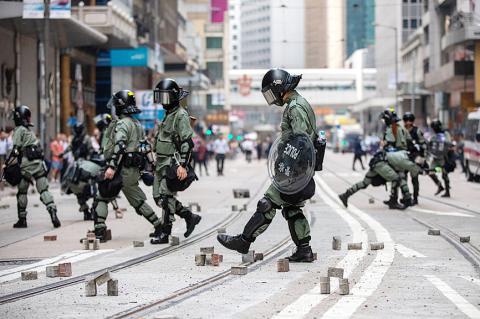Pro-democracy protesters challenging China’s rule of Hong Kong yesterday choked the territory with barricades and rallies for a fourth straight day, while police drafted in reinforcements and Chinese state media fueled speculation of a curfew.
The five-month crisis entered a new phase on Monday, when protesters embarked on a campaign to “blossom everywhere” across the territory in a bid to stretch police resources as thinly as possible.
Dressed in their signature black, masked protesters set up barricades on roads, vandalized train stations, rampaged through shopping malls and orchestrated rolling confrontations with riot police in multiple locations.

Photo: EPA-EFE
Another element of the protesters’ tactical shift was to disrupt the territory for consecutive days in a workweek, switching from their long-running strategy of primarily protesting on weekends or in evenings.
Yesterday, key arterial roads were again cut, many rail services were suspended, schools were closed, lunchtime rallies were held in the business district and protesters occupied universities.
With the protesters showing no signs of relenting, the nearly 30,000-strong police force announced it was drafting in 100 prison guards and looking for other reinforcements.
“The ongoing riots ... with their massive scale, simultaneous occurrence in various districts and grave severity of violence, make it necessary to strengthen the support for the police’s frontline officers,” a police spokesman said in a statement announcing that the prison guards would be called in.
No other reinforcement measures were announced, although Hong Kong Legislator Starry Lee (李慧瓊), of the territory’s biggest pro-Beijing party, urged the deployment of auxiliary officers.
The part-time volunteer force of civilians and ex-officers is usually used to direct traffic and control crowds at major outdoor sports or entertainment events.
In China, the Global Times reported that a Hong Kong curfew was possible.
The Global Times wrote online that the Hong Kong government was considering the implementation of a curfew at the weekend.
However, it later deleted the message.
“I just checked how the information was obtained ... the information is not sufficient to support this exclusive news,” Global Times editor Hu Xijin (胡錫進) said.

Taiwan is projected to lose a working-age population of about 6.67 million people in two waves of retirement in the coming years, as the nation confronts accelerating demographic decline and a shortage of younger workers to take their place, the Ministry of the Interior said. Taiwan experienced its largest baby boom between 1958 and 1966, when the population grew by 3.78 million, followed by a second surge of 2.89 million between 1976 and 1982, ministry data showed. In 2023, the first of those baby boom generations — those born in the late 1950s and early 1960s — began to enter retirement, triggering

ECONOMIC BOOST: Should the more than 23 million people eligible for the NT$10,000 handouts spend them the same way as in 2023, GDP could rise 0.5 percent, an official said Universal cash handouts of NT$10,000 (US$330) are to be disbursed late next month at the earliest — including to permanent residents and foreign residents married to Taiwanese — pending legislative approval, the Ministry of Finance said yesterday. The Executive Yuan yesterday approved the Special Act for Strengthening Economic, Social and National Security Resilience in Response to International Circumstances (因應國際情勢強化經濟社會及民生國安韌性特別條例). The NT$550 billion special budget includes NT$236 billion for the cash handouts, plus an additional NT$20 billion set aside as reserve funds, expected to be used to support industries. Handouts might begin one month after the bill is promulgated and would be completed within

The National Development Council (NDC) yesterday unveiled details of new regulations that ease restrictions on foreigners working or living in Taiwan, as part of a bid to attract skilled workers from abroad. The regulations, which could go into effect in the first quarter of next year, stem from amendments to the Act for the Recruitment and Employment of Foreign Professionals (外國專業人才延攬及僱用法) passed by lawmakers on Aug. 29. Students categorized as “overseas compatriots” would be allowed to stay and work in Taiwan in the two years after their graduation without obtaining additional permits, doing away with the evaluation process that is currently required,

IMPORTANT BACKER: China seeks to expel US influence from the Indo-Pacific region and supplant Washington as the global leader, MAC Minister Chiu Chui-cheng said China is preparing for war to seize Taiwan, Mainland Affairs Council (MAC) Minister Chiu Chui-cheng (邱垂正) said in Washington on Friday, warning that Taiwan’s fall would trigger a regional “domino effect” endangering US security. In a speech titled “Maintaining the Peaceful and Stable Status Quo Across the Taiwan Strait is in Line with the Shared Interests of Taiwan and the United States,” Chiu said Taiwan’s strategic importance is “closely tied” to US interests. Geopolitically, Taiwan sits in a “core position” in the first island chain — an arc stretching from Japan, through Taiwan and the Philippines, to Borneo, which is shared by